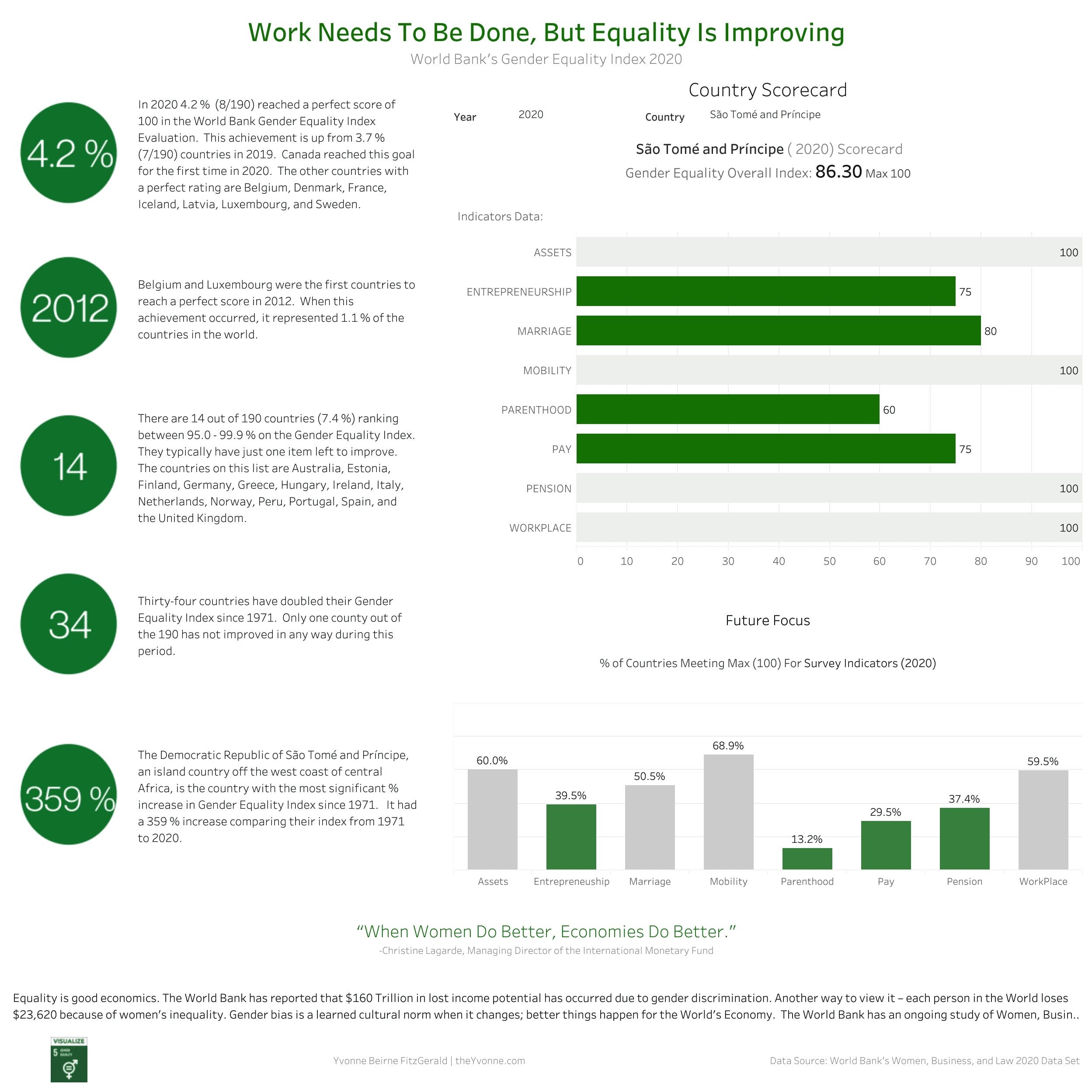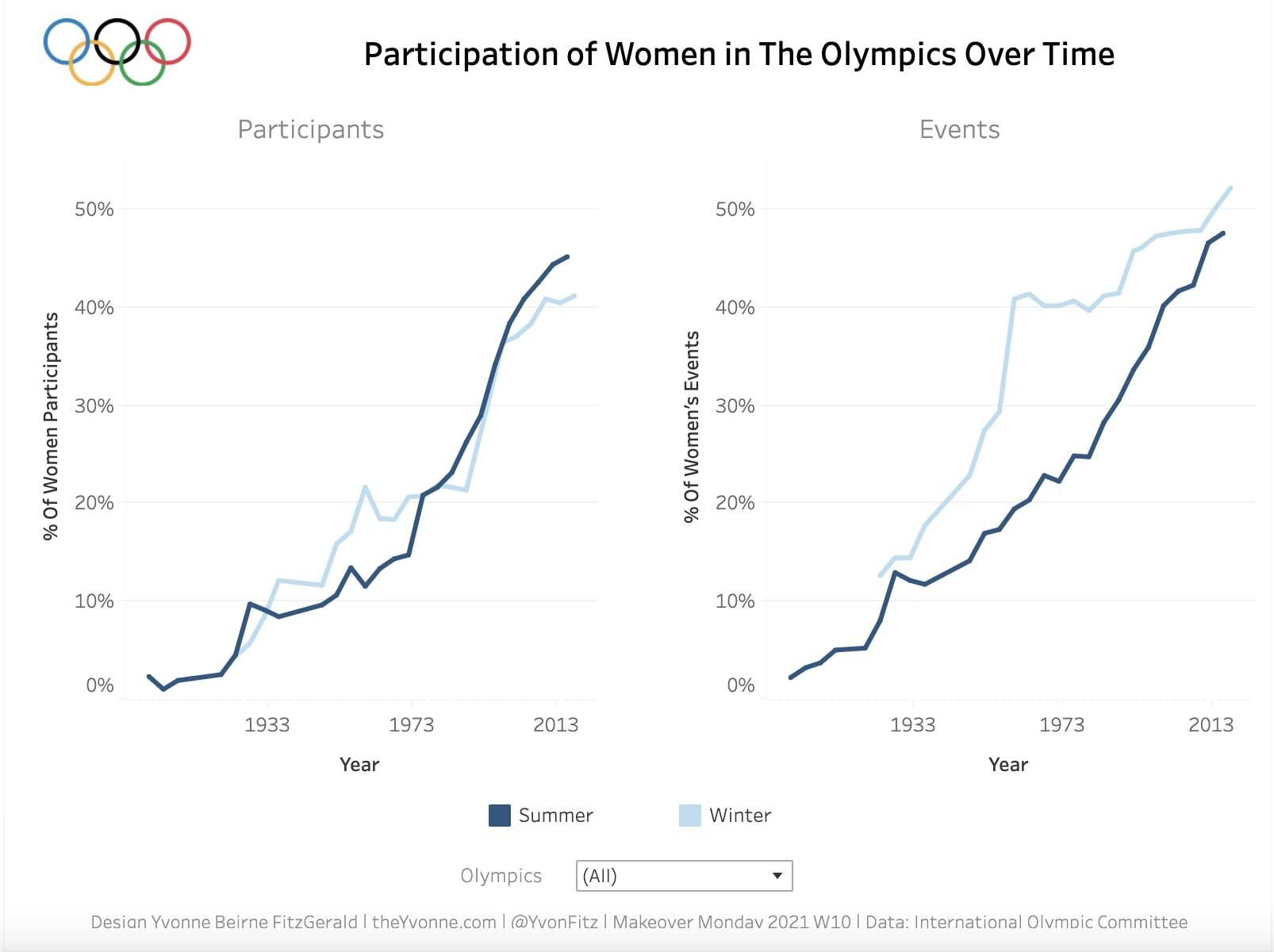
Yes, We Can!
Yes, We Can! Achieving Gender Equality
United Nations Sustainability Goal 5
United Nations Sustainable Development Goal Number 5 focus is on achieving Gender Equality. Several of my data visualizations highlight the progress countries have made on the goal's indicators targets.
Gender Equality
Index
Gender Equality is good economics. A $160 Trillion in loss of income potential occurs due to gender bias. The World Bank’s Gender Equality Index tracks changes over on key indicators.

“When women do better,
economies do better.”
Christine Lagarde
President of the European Central Bank
Background UN Sustainability Goals
In 2015, the United Nations (UN) members countries adapted 17 Sustainable Development Goals (SDGs), which also known as the Global Goals. The SDGs focused on eliminating discrimination against women and girls, protecting the planet, and ending poverty by 2030.
United Nations Sustainability Goal Number Five is for achieving gender equality and empowering all women and girls. When women and girls have equality, a country improves its economic growth and development. Gender Equality is also a fundamental human right. This goal has 9 Targets and 14 Indicators.
Gender equality is essential to the United Nations Sustainable Development goals. Since 2015 countries have shown improvement in gender equality. More work needs to be done, especially in eliminating sexual violence and sexual exploitation, unequal division of labor, and discrimination in public office. In addition, conflict, migration, climate change, and disasters disproportionately affect women and children.
References:
List of Targets and Indicators UN SDG5
-
END DISCRIMINATION
Target 1: End Discrimination against women and girls
Indicator 1.1: Legal frameworks for gender equality and non-discrimination based on sex exists and are enforced.
-
END VIOLENCE
Target 2: End all violence against and exploitation of women and girls in public and private spaces, including trafficking, sexual and other types of exploitation.
Indicator 2.1: End physical, sexual or psychological violence against women from an intimate partner
Indicator 2.2: End physical, sexual or psychological violence against women from persons other than an intimate partner
-
END CHILD MARRIAGE AND GENITAL MUTILATION
Target 3: Eliminate forced marriages and genital mutilation
Indicator 3.1: Reduce the number of women married or in a union before age 15 or 18
Indicator 3.2: Eliminate Female genital mutilation/cutting
-
VALUE UNPAID CARE
Target 4: Value unpaid care and promote shared domestic responsibilities
Indicator 4.1: Reduce time spent on unpaid domestic and care work
-
FULL LEADERSHIP PARTICIPATION
Description goes here
Target 5: Ensure full participation in leadership and decision-making in political, economic, and public life
Indicator 5.1: Increase women in political positions in (a) national parliaments and (b) local governments
Indicator 5.2: Increase women in the top, senior, and middle management positions
-
ACCESS TO REPRODUCTIVE RIGHTS & HEALTHCARE
Target 6: Universal access to sexual and reproductive rights and health
Indicator 6.1: Women have decision-making on contraceptive use and healthcare
Indicator 6.2: Guarantee of equal access to sexual and reproductive health care under the law
-
EQUAL RIGHTS TO ECONOMIC RESOURCES & OWNERSHIP
Target A: Equal rights to economic resources, property ownership, and financial services
Indicator A.1: Female agricultural land rights or ownership
Indicator A.2: Equal rights to land ownership
-
TECHNOLOGY EMPOWERMENT
Target B: Promote empowerment of women through technology, in particular information and communications technology
Indicator B.1: Increase mobile telephone ownership by women
-
ADOPT & STRENGTHEN POLICIES ON GENDER EQUALITY
Target C: Adopt and strengthen policies and enforceable legislation for gender equality
Indicator C.1: Systems to track gender equality and make public allocations for gender equality and women's empowerment

I raise up my voice—not so that I can shout,
but so that those without a voice can be heard.
We cannot all succeed when half of us are held back.
Malala Yousafzai
Nobel Peace Prize Laureate




